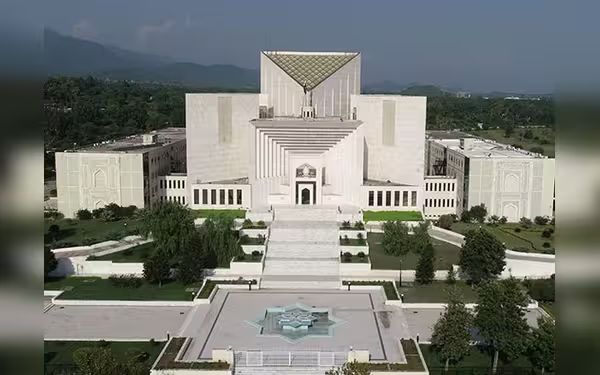Saturday, November 16, 2024 05:27 PM
Supreme Court Ruling Bolsters PTI's Political Standing
- Supreme Court affirms PTI's eligibility for reserved seats.
- ECP's request deemed 'misconceived' by the apex court.
- Court emphasizes immediate compliance with its orders.
 Image Credits: dailytimes_pk
Image Credits: dailytimes_pkSupreme Court's ruling strengthens PTI's position, affirming eligibility for reserved seats amid ECP's challenges.
The political landscape in Pakistan has taken a significant turn following a recent ruling by the Supreme Court regarding the Pakistan Tehreek-e-Insaf (PTI) party. On July 12, a full bench of 13 judges declared that PTI is eligible to receive reserved seats for women and non-Muslims in both the national and provincial assemblies. This decision has been a major blow to Prime Minister Shehbaz Sharif’s ruling coalition, potentially positioning PTI as the single largest party in Parliament.
On Saturday, the Supreme Court firmly rejected a request from the Election Commission of Pakistan (ECP) for clarification on this ruling. The court described the ECP's request as "misconceived" and accused it of employing "dilatory tactics" to delay the implementation of the court's decision. The apex court emphasized that the evidence presented left "little doubt" about the ECP's intentions, stating that the request was merely a contrived device to obstruct justice.
The court's written order highlighted that the ECP had previously recognized Barrister Gohar Ali Khan as the chairman of PTI. The Supreme Court pointed out that the commission cannot now seek guidance on how to handle certifications regarding the party's leadership. The court stated, "The commission cannot approbate and reprobate, taking whatever shifting stance as it desires." This means that the ECP cannot change its position based on convenience.
Furthermore, the Supreme Court reiterated that the PTI is an enlisted political party, and its status should be respected. The order noted that even dissenting judges acknowledged Barrister Gohar's validity as chairman, which was sufficient to act on the court's reserved seats verdict. The court argued that it would be illogical to claim that a political party is fully functional without anyone to perform its functions.
The Supreme Court also addressed the issue of reserved candidates, stating that once the necessary declarations and certifications are submitted, the candidates' positions are legally fixed. This means that the candidates who have been returned as members of the National Assembly (MNAs) and provincial assemblies (MPAs) are officially recognized as members of the PTI.
The Supreme Court's ruling not only strengthens PTI's position in the political arena but also sends a clear message to the ECP regarding its responsibilities. The court's insistence on immediate compliance with its orders underscores the importance of upholding the rule of law in Pakistan. As the political drama unfolds, it remains to be seen how the ruling coalition will respond to this setback and what implications it will have for the future of governance in the country.













